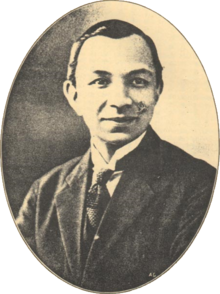Sir Robert Hormus Kotewall CMG (羅旭龢; 1880–1949) was a British Hong Kong businessman, civil servant and legislator.
Robert Kotewall | |
|---|---|
 Robert Kotewall | |
| Senior Unofficial Member of the Executive Council | |
| In office 1946 | |
| Governor | Cecil Harcourt |
| Preceded by | John Johnstone Paterson |
| Succeeded by | Arthur Morse |
| Personal details | |
| Born | Robert Hormus Kotewall 1880 |
| Died | 23 May 1949 British Hong Kong |
| Spouse | Edith Kotewall (nee Lowcock) |
| Occupation | Businessman |
| Robert Kotewall | |||||||||
|---|---|---|---|---|---|---|---|---|---|
| Traditional Chinese | 羅旭龢 | ||||||||
| |||||||||
Early life
editKotewall was born in 1880. He was the son of Hormusjee Rustomjee Kotewall, an Indian Parsi, and Cheung A-cheung.[1][2] He obtained his early education at the Diocesan Boys School and Queen's College.[3]
Career
editIn 1913, Kotewall was named Clerk to the Magistracy and JP. By 1919, he was in trade as the manager of the Hong Kong Mercantile Company. In 1923, he was invited to join the Legislative Council as an unofficial member, a position he held until 1935. In 1936, he joined the Executive Council.
During the Japanese occupation of Hong Kong, Kotewall served as the chairman of the Japanese military government's Chinese Representative Council and assisted the Japanese Army in governing Hong Kong. After Sir Mark Young was restored as the governor of Hong Kong, Kotewall submitted a 66-page report explaining the causes and consequences of his actions as a Chinese representative during the Japanese occupation period, but it was not accepted by the British government. Although he was not prosecuted for treason, he was still blacklisted by the Hong Kong government and for the rest of his life would never again be appointed to official positions. At the same time, he was also listed as one of the traitors sought by the Guangdong government of the Republic of China, so he rarely subsequently participated in public life. Kotewall died in 1949.[4]
He was decorated the insignia C.M.G by King George V in 1927.
Personal life
editKotewall's wife was Edith (nee Lowcock) Kotewall (b. 1889). She was the daughter of George Lowcock and granddaughter of Henry Lowcock, an English businessman in Hong Kong.[5] They had 9 children. His great-grandson is actor, Max Minghella. His great-granddaughter is former Olympic swimmer Robyn Lamsam Convery,[6][7][8] and his grandson is cricketer Roy Lamsam.
Legacy
editKotewall Road, in Mid-Levels, Hong Kong Island,[citation needed] and Sir Robert Kotewall Hall in the campus of St Paul's Co-educational College, are named after him.[9]
Gallery
edit-
Robert Kotewall (2nd right) as part of the administration of Geoffry Northcote (centre)
-
A portarit of Robert Kotewall on a newspaper in 1947
-
Statue of Robert Kotewall in Hong Kong Central Library
See also
edit- St. Paul's Co-educational College
- Kotwal, an Indian title
References
edit- ^ Teng, Emma (2017). "Hong Kong's Eurasian "Web" Viewed through the Lens of Inter-Asian Studies". The Journal of Asian Studies. 76 (4): 943–951. doi:10.1017/S0021911817000948. JSTOR 26572397. S2CID 165172420.
- ^ "R. H. Kotewall (Lo Kuk-wu)". thechinastory.org. Archived from the original on August 10, 2018. Retrieved June 19, 2019.
- ^ The Prominent Chinese in Hong Kong (1937). Sunyata. 16 April 2019. ISBN 9789888582655.
- ^ Hahn, Emily (1944). China to Me. Open Road Media.
- ^ "Kotewall, Edith". webb-site.com. Retrieved June 19, 2019.
- ^ "The Fentons".
- ^ "MRS Cicely Kotewall Zimmern".
- ^ "Webb-site Who's Who: Kotewall Fenton, Patricia".
- ^ "「聖保羅男女」百歲 傳承義教路 一場戰爭 成全港首間男女校".
External links
edit- R. H. Kotewall (Lo Kuk-wu) 羅旭龢 Archived 2018-08-10 at the Wayback Machine from Biographies of Prominent Chinese c.1925.